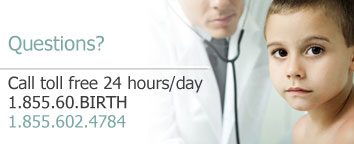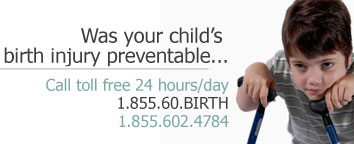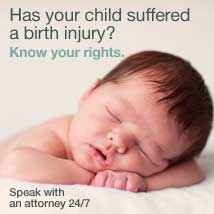Understanding Cerebral Palsy
 Cerebral palsy might be the result of problems with a fetus’s development or due to birth injuries occurring at delivery. It influences a person’s posture and movement and is a motor disorder.
Cerebral palsy might be the result of problems with a fetus’s development or due to birth injuries occurring at delivery. It influences a person’s posture and movement and is a motor disorder.
In the event that the disorder is due to a medical mistake, it is possible to file a lawsuit against the doctor, medical staff, and/or hospital.
The possible symptoms of cerebral palsy begin to show at infancy. It results in involuntary movement and sudden reflex action, a rigidness of the limbs, and movements that are impaired. The effects of cerebral palsy are different from one person to another. Some people will have problems with hearing or seeing; others have intellectual damage. There are therapeutic techniques to assist people in managing their condition and to try and control their cerebral palsy symptoms.
Cerebral palsy symptoms
Cerebral palsy is an encompassing term referring to multiple neurological issues that affect a person’s body movement. These issues become evident during childhood and don’t get worse as time passes. A main cause of cerebral palsy is a brain abnormality. In most cases, there won’t be a showing of clear symptoms until 2-3 years after birth. Some signals of cerebral palsy are:
• Ataxia (absence of muscle coordination)
• A scissor-like or crouched walking style
• Floppy or stiff-looking muscle tone
• Dragging of the leg
• Using one foot to walk
• An exaggeration of reflexes
• Tight or stiffened muscles
• Walking on the toes
Causes of cerebral palsy
Many people suffering from cerebral palsy have this condition at birth. In some, it develops after a child has endured some type of brain damage in the months after birth. Some possible causes from infancy are bacterial infections such as encephalitis and meningitis. It could also be caused by falls or accidents.
It is possible that cerebral palsy results from an absence of oxygen at gestation. In may instances, it’s not anyone’s fault.
One of the most common factors for a child developing cerebral palsy is medical negligence. If a member of the medical staff doesn’t adhere to proper protocols at birth, it could cause an injury and lead to cerebral palsy. If the infant’s vital signs are not watched closely or if the medical staff doesn’t communicate, these can spur a lawsuit.
A cerebral palsy lawsuit might raise the following allegations:
• Cesarean section not performed in a timely fashion
• A medical condition that is not identified and treated before birth
• Failure to act to signals of fetal distress
• Not controlling the speed of labor and delivery
• Improper use of vacuum extraction equipment
• Not monitoring the infant’s heart rate
Treatments for cerebral palsy
Cerebral palsy cannot be cured, but it is possible for children to live relatively normal lives with proper management of the condition. An important factor is detecting the condition early. If there is early detection, the more quickly the child can be helped. Some of the treatments and equipment that can be used are:
• A wheelchair
• Surgery to correct any correctible problems
• Braces
• Computerized tools such as a voice synthesizer
• Medication for seizure control
Medical equipment and treatments for cerebral palsy can be expensive. If there is a belief that the condition was caused by medical negligence, the family and the child are within their rights to seek compensation through a lawsuit.
Filing a cerebral palsy lawsuit
If there has been medical malpractice causing cerebral palsy, a family might be eligible to receive a substantial amount of money in a lawsuit. When there has been an error by the medical professionals trusted to ensure a proper and safe birth, there is legal recourse for families to file a case.
If it is possible to prove that medical mistakes led to the cerebral palsy diagnosis, an attorney from Balkin & Eisbrouch can help a family to file a lawsuit and gain compensation for the mistakes that were made and the future expenses that accompany cerebral palsy. There is no charge unless you win your case. Contact Balkin & Eisbrouch for a consultation today.




